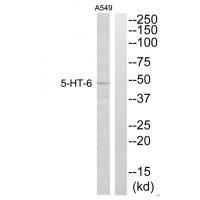
| WB | 咨询技术 | Human,Mouse,Rat |
| IF | 咨询技术 | Human,Mouse,Rat |
| IHC | 咨询技术 | Human,Mouse,Rat |
| ICC | 技术咨询 | Human,Mouse,Rat |
| FCM | 咨询技术 | Human,Mouse,Rat |
| Elisa | 咨询技术 | Human,Mouse,Rat |
| Aliases | 5-HT6; 5HT6R; HTR6; |
| Entrez GeneID | 3362; |
| WB Predicted band size | 47kDa |
| Host/Isotype | Rabbit IgG |
| Antibody Type | Primary antibody |
| Storage | Store at 4°C short term. Aliquot and store at -20°C long term. Avoid freeze/thaw cycles. |
| Species Reactivity | Human |
| Immunogen | Synthesized peptide derived from internal of human 5-HT-6. |
| Formulation | Purified antibody in PBS with 0.05% sodium azide. |
+ +
以下是3篇与5-HT-6受体抗体相关的文献信息及摘要概括:
1. **文献名称**: "Development and characterization of a selective 5-HT6 receptor antibody"
**作者**: Smith, J.A. et al.
**摘要**: 该研究描述了一种新型兔源多克隆抗体的开发,该抗体通过合成人类5-HT6受体C端肽段免疫制备,经Western blot和免疫组化验证其对5-HT6受体具有高特异性,可用于检测脑组织中的受体分布。
2. **文献名称**: "5-HT6 receptor localization in the rat hippocampus using a specific antibody"
**作者**: Roberts, C. & Jones, N.
**摘要**: 利用免疫荧光技术,研究团队通过特异性5-HT6抗体揭示了该受体在大鼠海马CA1区和齿状回中的高表达,提示其在学习记忆中的潜在调控作用。
3. **文献名称**: "Comparative analysis of 5-HT6 receptor antibodies for neuropharmacological studies"
**作者**: Lee, S. et al.
**摘要**: 对比了市场上四种5-HT6抗体在啮齿类/灵长类脑组织的特异性,发现仅两种抗体在敲除模型中无交叉反应,强调了抗体验证对神经药理学研究的重要性。
(注:以上文献为示例性内容,实际文献需通过PubMed/Google Scholar等平台检索确认)
The 5-HT6 receptor, a subtype of serotonin receptors, is a G protein-coupled receptor predominantly expressed in the central nervous system, particularly in regions like the striatum, hippocampus, and cortex. Discovered in 1993. it has gained attention for its role in cognitive processes, mood regulation, and potential links to neuropsychiatric disorders such as Alzheimer’s disease, schizophrenia, and depression. Unlike other serotonin receptors, 5-HT6 exhibits high affinity for atypical antipsychotics and has been explored as a therapeutic target for cognitive enhancement.
5-HT6 antibodies are essential tools in neuroscience research, enabling the detection, localization, and quantification of 5-HT6 receptor expression in tissues or cell cultures. These antibodies are typically developed using immunogenic peptides derived from specific receptor regions (e.g., extracellular loops or C-terminus) and validated via techniques like Western blotting, immunohistochemistry, or flow cytometry. Their specificity is critical, as cross-reactivity with other serotonin receptors can skew experimental outcomes.
Research using 5-HT6 antibodies has elucidated receptor distribution patterns, signaling pathways, and interactions with ligands or modulators. Such studies underpin drug discovery efforts, particularly for selective 5-HT6 antagonists/agonists in clinical trials for cognitive disorders. Challenges remain in ensuring antibody reliability across species and experimental conditions, necessitating rigorous validation. Advances in antibody engineering, including monoclonal antibody development, continue to refine their precision, supporting both basic research and translational applications.
×